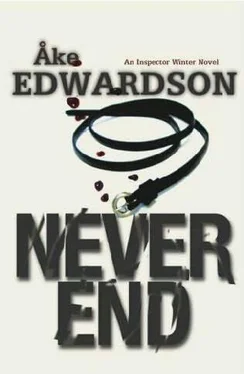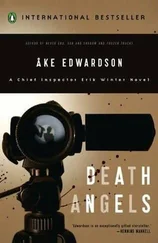***
The house was overlooked by trees that could be a hundred years old. The house itself might also be a hundred years old, Winter thought. A well-preserved centenarian. Old money. Like so much around here, the oldest part of Längedrag. He had grown up only a mile or so closer to town, biked along these streets occasionally. Welcome to Pleasantville.
Two boys came toward him on skateboards. They were good. He stood to one side, then continued along the street and up the drive to the house. A man was sitting on the verandah and stood up when he saw Winter coming up the steps. They shook hands. Jeanette's father. Winter hadn't met him before. Nor had he met Jeanette, it had been Halders. But Halders had different problems today.
"Is this really necessary?" Kurt Bielke asked. He was shorter than Winter, but didn't look up when he spoke to him. His tone was not aggressive, more of a troubled sigh.
That was a good question. How many times could one come back to the victim without her becoming resentful? That would do more harm than good.
"If you push them too hard you'll get all you want out of them in the end, but is what you get the truth?" Halders had said two days ago, when they were sitting in Winter's office. A good point. You can overdo questioning.
"We need to talk to Jeanette a little bit more."
"We?" said Bielke. "I can only see one of you."
"I."
What do you need to talk about? She's told you a hundred times now what she's been through."
Winter made no reply. He wondered whether there was any point in explaining about all the little details that could slowly find their way into a victim's consciousness, bits of an experience that build up to form something more substantial. Sometimes everything could come out at once. At 2:00 a.m. in a lonely place, like a sword in the soul. If Jeanette remembered now it would make things easier for her later.
"Things sometimes become clearer after a while," said Winter. "After a few days."
"What kinds of things?" Bielke was gazing into the distance behind Winter. He still didn't sound aggressive. His face was tense, stiff, as if it was molded aluminum. "Exactly what happened second by second during the rape? How he pulled the noose around her neck, or what?"
Winter said nothing.
"What good will it do her to remember all the details?"
"I don't know," said Winter.
"Why are you here then?"
"There's been a murder," said Winter.
Bielke looked at him. He'd moved closer. Winter thought he could smell alcohol, but it might have been shaving lotion. Shaving lotion was alcohol, after all. Bielke wiped his brow. Winter could see the sweat at his hairline. He was feeling the heat himself, now that they'd been standing still for a while on the verandah under a canopy that seemed to raise the temperature, if anything. The verandah must be like a sauna during the afternoon.
"My God, yes," mumbled Bielke. "I should have realized." He wiped his brow again. "You think it might be the same… criminal?"
"It could be the same person," Winter said. "We have no proof, but it's a possibility."
"You call it a possibility?"
"I'm sorry?"
"I wouldn't have used that word," said Bielke.
He blinked repeatedly. Winter suddenly had the feeling that Bielke was thinking about something quite different. He seemed lost in memories.
"Can I see Jeanette now?" asked Winter, taking a step to one side.
"She's up in her room." Her father backed away, as if the path was now clear to walk on. Cleared of mines. "She didn't want to come down."
Winter entered the house with Bielke behind him. Bielke pointed up a staircase to the left of the door. Winter could hear the sound of clinking glass and china coming from somewhere inside the house. He saw nobody else as he went up the stairs. The house reminded him of a palace.
Jeanette's door was open. Winter could see the corner of a bed, and a window in the shade of one of the big trees. The uncomfortable feeling he'd had in the car on the way here had grown stronger after the conversation with the girl's father. It crept all over him, inside all his professional thinking. Angela would say that was no bad thing. That it had to be that way, or it was not good, not good at all.
"Come in," she said, when he knocked on the door frame. He still couldn't see her. "Come on in."
She was sitting in an armchair. There was a sofa and a table, and a bit farther away a desk, next to a door that he could see led into a private bathroom. Old money, or new, or a combination of both.
She was brushing her dark brown hair. A face without makeup, as far as he could see. Jeans, T-shirt, no socks. A fine gold chain round her neck. She continued brushing her hair with long strokes and her face distorted slightly with each one: her eyes narrowed, giving her an almost oriental look.
She gestured toward the sofa. Winter sat down and introduced himself.
"It was a different one before," said Jeanette.
Winter nodded.
"Is that a sort of tactic?" she asked.
"What do you mean?"
"You send different people to take care of the… talking. Interrogation, or whatever you call it."
"Sometimes," said Winter. "But not on this occasion."
"What do you mean by that?"
Winter didn't reply.
"I liked the one who was here before," said Jeanette, putting down her brush. "Fredrik… Inspector Halders." She looked at Winter. "Isn't that good? In which case it's a rotten tactic to change that, don't you think?"
OK, thought Winter, I'll tell her. And he explained what had happened to Halders's ex-wife.
"I won't ask anything else," she said.
"Is it OK if I do?" Winter leaned forward on the sofa. She nodded. A bird flew against the window, then flew off without her seeming to notice the dull thump on the pane. "Is there anything that's… come to mind since you last spoke to Fredrik? Anything at all?"
She shrugged.
"Like what?" she asked.
"Anything at all. From that evening. That night."
"I prefer not to think about it. I told that to… Fredrik as well." She started brushing again, and her face changed. "All I can think about is, am I going to get AIDS or something." She was brushing even more vigorously, and looked at Winter through eyes that were mere slits now. "Or HIV, rather. I don't know the exact terminology."
Winter didn't know what to say. He considered getting up and smoking a Corps by the window.
"Do you mind if I stand by the window and smoke?"
"Course not," she said, and there might even have been the trace of a smile when she added: "But look out for Dad, don't let him see you." She looked away. "He sees everything. He knows everything."
"What do you mean?"
"Oh, nothing. But look out."
"Look down, you mean," said Winter, standing up and taking the slim white packet from his left breast pocket and removing the cellophane from a cigarillo.
"What did you say?"
"I have to look down from here, to look out to make sure your dad doesn't see me."
"Ha, ha."
Winter opened the window and lit his cigarillo. The lawn looked about as big as a football field between the branches of the trees. He could hear the clink of ice cubes in a glass from down below, and faint voices that he couldn't quite catch. Something was poured into a glass. Half past ten, not time for a lunch drink yet. But it was holiday time. He blew smoke out of the window and turned back into the room.
Perhaps their daughter had been infected with HIV.
"What I meant a minute ago when I said I might never be sure about the terminology was that I was supposed to be starting my medical studies this autumn," she said, "but I'm not going to bother now."
"Why not?"
"Ha, ha again."
Winter took a drag at his cigarillo and blew the smoke out through the window. He heard a woman saying something in what sounded like an agitated voice and Kurt Bielke came into view as he strode across the lawn and then along a path to a black car standing in the drive. He started the engine and drove away toward the center of town. Winter remained standing with his back to the room. He heard a lawn mower, saw a cascade of water coming from a sprinkler, saw the two boys coming back on their skateboards, saw a woman with a baby carriage. Everything was normal out there in paradise.
Читать дальше












